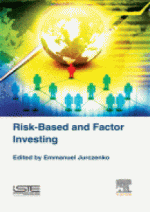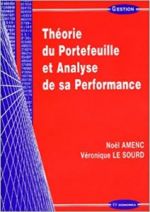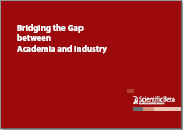
Equity
Equities are a major asset class for institutional and individual investors, who use them in the hope of achieving high returns in the long run, possibly at the cost of substantial downside risk in the short run. Traditionally, equity portfolios have been benchmarked against cap-weighted indices, and active funds have attempted to outperform the market. This landscape has profoundly evolved since the early 2000s with the recognition that cap-weighted indices fail to efficiently capture risk premia available in equities, and with a growing demand for transparent and low-fee investment products. These concerns have favoured the emergence of exchange-traded funds (ETFs) and the development of many alternative equity indices, notably including factor indices and smart beta products. After the rise in passive investing and factor investing, the new frontier in equity investing will be the inclusion of ESG criteria, to meet the demand for products that satisfy social responsibility criteria and/or low-carbon footprint conditions.
EDHEC-Risk Institute has been conducting research in equity investing since 2006, with an annual survey on the practices of European ETF investors and a number of research articles on equity factors and efficient diversification of equity portfolios.
As part of its policy of transferring knowledge to the industry, it set up Scientific Beta in 2012 to favour the adoption of the latest advances in smart beta design and implementation by the whole investment industry. In January 2020, Scientific Beta was acquired by Singapore Exchange (SGX) for EUR186 million.
FUNDAMENTALS OF INSTITUTIONAL ASSET MANAGEMENT
by Frank J. Fabozzi, Francesco A Fabozzi
This book provides the fundamentals of asset management. It takes a practical perspective in describing asset management. Besides the theoretical aspects of investment management, it provides in-depth insights into the actual implementation issues associated with investment strategies. The 19 chapters combine theory and practice based on the experience of the authors in the asset management industry. The book starts off with describing the key activities involved in asset management and the various forms of risk in managing a portfolio. There is then coverage of the different asset classes (common stock, bonds, and alternative assets), collective investment vehicles, financial derivatives, common stock analysis and valuation, bond analytics, equity beta strategies (including smart beta), equity alpha strategies (including quantitative/systematic strategies), bond indexing and active bond portfolio strategies, and multi-asset strategies. The methods of using financial derivatives (equity derivatives, interest rate derivatives, and credit derivatives) in managing the risks of a portfolio are clearly explained and illustrated.
World Scientific - 2020
RISK-BASED AND FACTOR INVESTING
by Noël Amenc, Felix Goltz, Ashish Lodh, Romain Deguest, Lionel Martellini, Eric Shirbini
Lionel Martellini from EDHEC-Risk Institute, together with Noël Amenc, Felix Goltz, and Eric Shirbini from ERI Scientific Beta, contributed a chapter to the book entitled, "Designing Multi-Factor Equity Portfolios", which examines the following topics: Designing efficient and investable proxies for risk premia Risk allocation with smart factor indices Absolute return perspective: Absolute risk management without factor risk exposure constraints; Introducing risk-budgeting constraints; Long-term evidence in the USA universe Relative risk perspective: Methodology; Risk contributions and performance; Relative risk allocation using long-term USA factor indices Index design and allocation decisions for multi-factor equity portfolios
ISTE Press - Elsevier - 2015
PORTFOLIO THEORY AND PERFORMANCE ANALYSIS
by Noël Amenc, Véronique Le Sourd
For many years, asset management was considered to be a marginal activity, but today, it is central to the development of the financial industry throughout the world. Asset management's transition from an "art and craft" to an industry has inevitably called integrated business models into question, favouring specialisation strategies based on cost optimisation and learning curve objectives. This book connects each of these major categories of techniques and practices to the unifying and seminal conceptual developments of modern portfolio theory. .
John Wiley & Sons - 2003
PORTFOLIO THEORY & PERFORMANCE ANALYSIS
by Noël Amenc, Véronique Le Sourd
In the last ten years, commercial and technical innovations have been increasingly prevalent within the asset management industry. It therefore seems essential to allow both practitioners and researchers to situate these innovations within a clear and consistent conceptual framework. That is the objective fixed by this publication, which establishes a link between the major concerns of managers (evaluating the investment management process, measuring performance and controlling risk) and the results of research into portfolio theory. Notable subjects are the implementation of multifactor and style analysis models for performance and risk measurement. These probably constitute the most significant conceptual advances for the asset management industry since the formalisation of the capital asset pricing model. Finally, a review of criticisms of the models and results from the literature on portfolio performance attribution allow the reader to comprehend, with a sense of perspective, the academic and empirical "evidence" in the area of measurement and persistence of the outperformance of funds and managers.
Economica - 2002
QUANTITATIVE EQUITY PORTFOLIO MANAGEMENT
by Noël Amenc, Véronique Le Sourd
Modern portfolio management theory has put forward quantitative approaches for measuring portfolio risk. Equities constitute a privileged realm of application for this theory. The book describes the main quantitative methods used in managing equity portfolios. Following a presentation of the principal asset pricing models, i.e. DDM, CAPM and APT, the book presents the methods used for the active selection of securities based on these models. It then deals with the different types of index management: pure replication, synthetic replication and tilted index management. Lastly, a major section is dedicated to static and dynamic methods of portfolio insurance. This publication also covers the main categories of active and passive management strategies that correspond to current investor requirements. The extensive bibliography will assist the reader who wishes to pursue the subject further.
Economica - 1998

Scientific Beta aims to encourage the entire investment industry to adopt the latest advances in smart factor and ESG/Climate index design and implementation. Established in December 2012 by EDHEC-Risk Institute, one of the top academic institutions in the field of fundamental and applied research for the investment industry, as part of its mission to transfer academic know-how to the financial industry, Scientific Beta shares the same concern for scientific rigour and veracity, which it applies to all the services that it provides to investors and asset managers. We offer the smart factor and ESG/Climate solutions that are most proven scientifically, with full transparency of both methods and associated risks.
On January 31, 2020, Singapore Exchange (SGX) acquired a majority stake in Scientific Beta. SGX is maintaining the strong collaboration with EDHEC Business School, and principles of independent, empirical-based academic research, that have benefited Scientific Beta’s development to date.
As of July 31, 2022, there was USD 52.47bn in assets replicating Scientific Beta indices. More than 45% of Scientific Beta's assets under replication refer to indices with an ESG or Climate flavour.
Scientific Beta has a dedicated team of 55 people who cover not only client support from Nice, Singapore and Boston, but also the development, production and promotion of its index offering. Scientific Beta signed the United Nations-supported Principles for Responsible Investment (PRI) on September 27, 2016. Scientific Beta became an associate member of the Institutional Investor Group on Climate Change (IIGCC) on April 9, 2021 and a member of the Investor Group on Climate Change (IGCC) on November 28, 2022.
As a complement to its own research, Scientific Beta supports an important research initiative developed by EDHEC on the subjects of ESG and climate investing and cooperates with V.E and ISS ESG for the construction of its ESG and climate indices.
EDHEC-Risk Efficient Equity Indices
The FTSE EDHEC-Risk Efficient Index Series aims to capture equity market returns with an improved risk/reward efficiency compared to cap-weighted indices. The weighting of the portfolio of constituents achieves the highest possible return-to-risk efficiency by maximising the Sharpe ratio.
Further information is available at:
http://www.ftse.com/products/indices/EDHEC-Risk
FTSE EDHEC-Risk ERAFP SRI Index
The FTSE EDHEC-Risk Efficient Eurobloc ERAFP SRI Large Cap Custom Index aims to efficiently capture the performance available within an SRI screened universe of large and mid cap stocks in the Eurobloc. While the SRI screen allows addressing non-financial objectives, the efficient weighting scheme seeks to improve return-to-risk efficiency by improving portfolio diversification. While the screen relies on qualitative information on companies' SRI compliance, the weighting method uses robust estimates of a stock’s risk and return as inputs.
For further information, please contact FTSE.
 EDHEC-Risk Institute has developed an active research programme in the construction of and allocation to smart equity indices.
EDHEC-Risk Institute has developed an active research programme in the construction of and allocation to smart equity indices.
This programme has benefited from the continued and historical support of Amundi since 2009 in the context of the “ETF, Indexing and Smart Beta Investment Strategies” research chair.
It has also included “Financial Risk Management as a Source of Performance" research chair with the support of The French Asset Management Association (Association Française de la Gestion Financière, AFG) , ”the “Active Allocation to Smart Factor Indices” research chair, in partnership with Rothschild & Cie, the “Maximizing Volatility Pumping Benefits in Equity Markets” research chair, in partnership with Banque de France Gestion and the Eurex "Benefits of Volatility Derivatives in Equity Portfolio Management" strategic research project will be on optimising access to the equity risk premium while controlling for downside risk.
Since as early as 2006, EDHEC-Risk Institute has produced research on the inefficiency of cap-weighted equity indices supported by Af2i (French association of institutional investors), BNP Paribas Asset Management and UBS.








